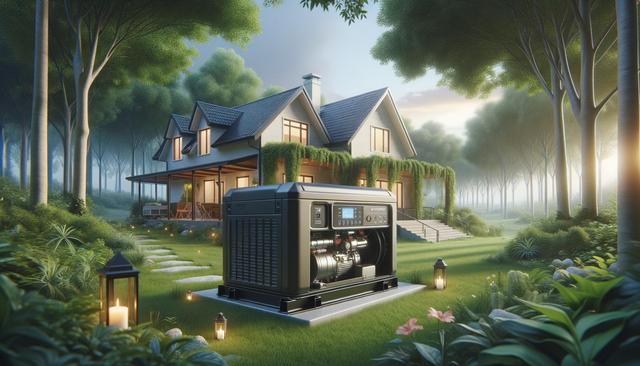Why Consider a Home Backup Generator?
Power outages can happen at any time, often without warning. Severe weather, infrastructure issues, or accidental damage to power lines can leave homes without electricity for hours or even days. A home backup generator provides a dependable source of power during such disruptions, ensuring that essential appliances and systems continue to operate. Many homeowners turn to these systems to maintain comfort and safety during blackouts, especially in areas prone to frequent outages.
Home backup generators are particularly useful for households with specific needs, such as medical equipment that requires constant power, or where remote work depends on internet connectivity and powered devices. In addition to convenience, these systems can also help prevent costly damages caused by power loss, such as food spoilage or frozen pipes. Overall, investing in a generator adds a layer of security and peace of mind.
Types of Home Backup Generators
There are two main types of home backup generators: portable and standby. Each has its own advantages and is suited to different needs and budgets. Understanding the differences can help you make an informed decision.
- Portable Generators: Typically smaller and more affordable, these units can be moved as needed and manually connected during an outage. They are ideal for powering a few essential appliances or tools.
- Standby Generators: Permanently installed outside the home, these systems automatically start when power goes out. They are capable of powering the entire home and often run on natural gas or propane.
Choosing between the two depends on factors like home size, frequency of outages, and budget. Standby generators offer more convenience and capacity, while portable units provide flexibility and lower initial cost.
Installation and Maintenance
Proper installation is essential for the safe and effective use of a home backup generator. For standby models, professional installation is typically required to ensure the unit is correctly connected to your home’s electrical system and fuel source. This process also involves obtaining necessary permits and inspections in many areas.
Maintenance is another important aspect to consider. Regular checks and servicing help ensure the generator operates reliably when needed. Key maintenance tasks include:
- Changing the oil and filters
- Checking fuel levels and connections
- Running periodic test cycles
- Inspecting the battery and electrical components
Most manufacturers provide maintenance schedules, and many homeowners choose to enroll in service plans for added convenience.
Fuel Sources and Efficiency
Home backup generators can run on various fuel types, including gasoline, diesel, propane, and natural gas. Each option has its benefits and considerations. Natural gas and propane are popular for standby generators due to their stable supply and cleaner emissions. Portable generators often use gasoline or diesel, which are more accessible but may require storage and handling precautions.
Fuel efficiency varies by generator size and usage. It’s important to choose a model that meets your power needs without consuming excessive fuel. Some high-efficiency models are designed to optimize fuel use while maintaining consistent output, which can be advantageous during prolonged outages.
When selecting a fuel type, consider factors such as availability in your area, storage capacity, environmental impact, and long-term costs. Your choice can influence the generator’s performance and suitability for your home.
Choosing the Right Generator for Your Home
Selecting the right home backup generator involves evaluating your household’s energy requirements and lifestyle. Start by identifying the essential appliances you want to power during an outage—refrigerators, heating and cooling systems, lighting, and medical equipment are common priorities. Calculating the total wattage needed can help you determine the appropriate generator size.
Additional considerations include:
- Noise levels
- Warranty and support options
- Safety features such as automatic shutoff
- Smart technology integration for remote monitoring
Consulting with a licensed electrician or generator specialist can provide valuable insight into your specific needs and help you navigate the wide range of available models. Taking the time to research and compare options will lead to a more reliable and satisfactory outcome.
Conclusion
For homeowners looking to enhance their resilience against power outages, a home backup generator is a practical and worthwhile investment. Whether you opt for a portable or standby model, understanding your energy needs and available resources is key to making an informed choice. With proper installation and maintenance, a generator can provide consistent power, peace of mind, and added protection for your household. By evaluating the features and fuel options carefully, you’ll be better equipped to select a system that aligns with your lifestyle and ensures comfort when it matters most.












